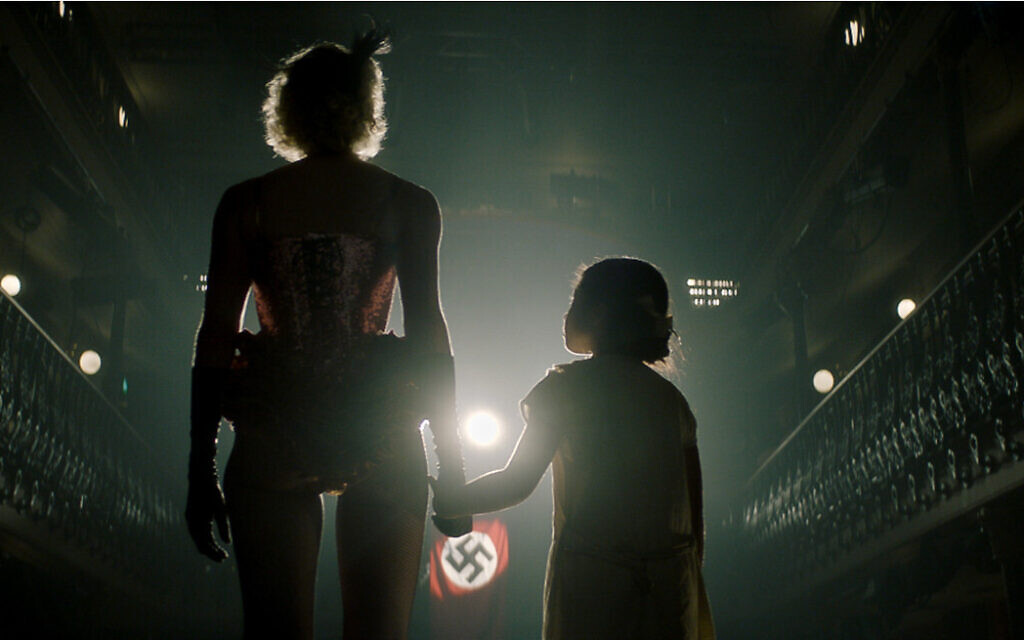Where artsy meets Nazi
Andrew Gold reviews and chats to director David Bartlett about his charity film that is an Oscar contender
The headline for this feature may seem facetious.
But it feels fitting for a short film about a Romani girl hiding from the Nazis in a bohemian cabaret club reminiscent of the dark playground in iconic musical Cabaret.
The girl in the story escapes from her cell in the attic, and delves down into the theatre.
Get The Jewish News Daily Edition by email and never miss our top stories Free Sign Up
There, she finds on stage all manner of curious demons, including a tap-dancing Dracula-like devil who points to the girl’s cultural traditions.
But scarier monsters lie in wait.
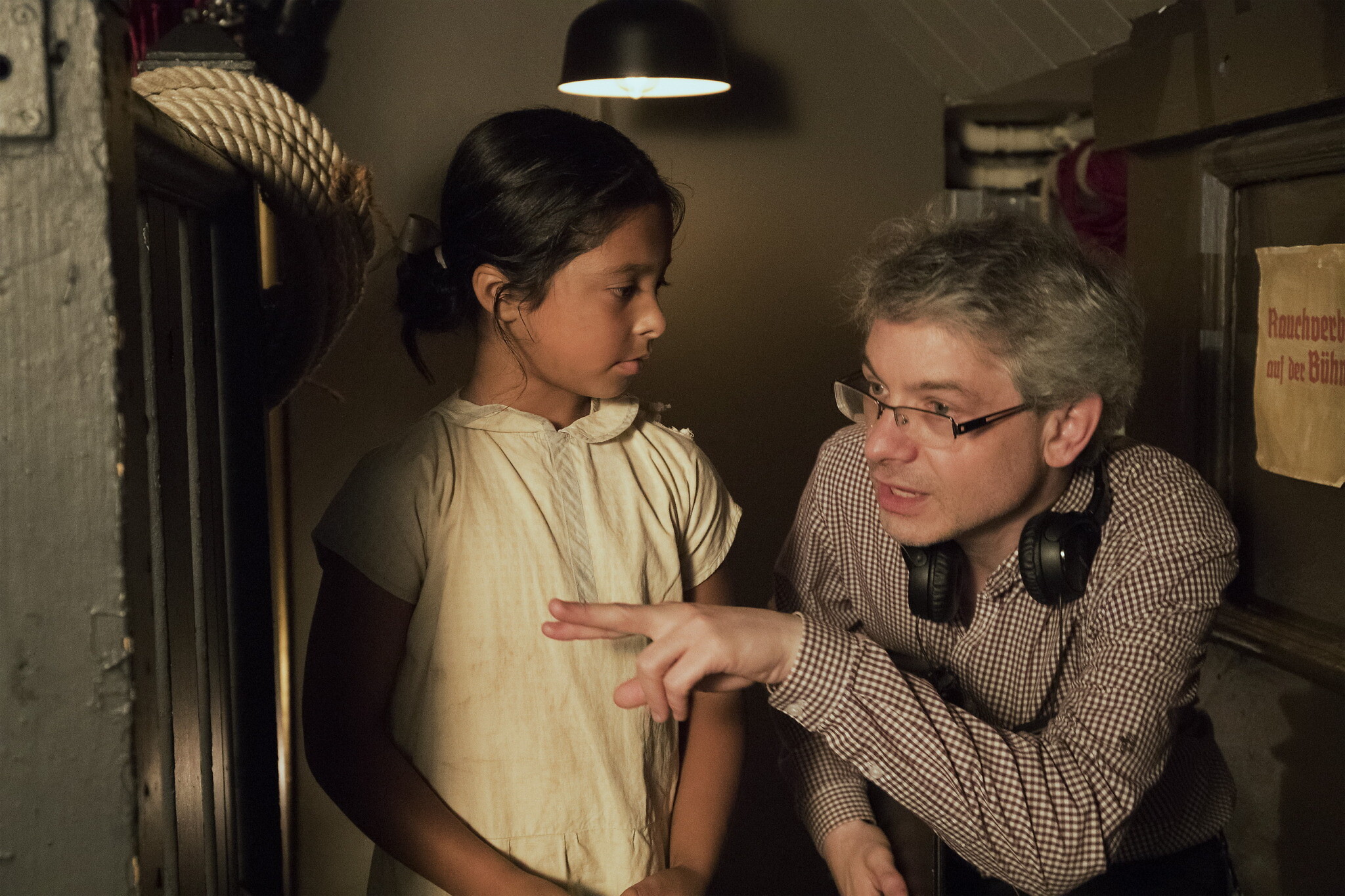
Mousie played by Sasha-Watson-Lobo- with director-David-Bartlett.
Directed by David Bartlett, Mousie is, among many things, a reflection of how art prevails in the face of oppression. The short film (17 minutes) made to support the Separated Child Foundation charity for lone refugees – is an Oscar hopeful, and rightly so. It hits us with scenes so harrowing and memorable they would steal the show in any Oscar ‘through the years’ reel. One particular snapshot sees the girl publicly exposed, a hand outstretched by an ally risking everything, all set against an unfurled flag of the German Reich – the first time we see it in such magnitude. Such is the power of the shot, I have to steady myself to recall it in words.
But, as I reach for the tissues, let’s rewind. The film begins in darkness against archive of Hitler’s incessant ranting. “We have work to do,” he splutters, in that ominous manner at once out-of-control yet perfectly in control that is peculiar to the Führer. A wide-eyed Roma girl known only as Mousie opens a curtain, and taps on the walls of her enclosure. Tapping will be a symbol of artistic rebelliousness throughout.
In the cabaret club, the flamboyancy of burlesque comes off as a natural foil to the Nazis sober fury. And yet, one sits in their midst, green uniform tightly fitted, and a face as unsteady as it is unreadable. Unaware of one another in this smoky basement, Nazi predator and Roma prey let a Dracula devil entrance them with dance.
Jewish people sometimes prickle when reminded of the plight of others – be they disabled, Romani or black – at the hands of the Nazis. This is particularly true when it comes from those trying to mitigate Jewish sorrow. There’s none of that in this film, which defers to Jewish hurt in scenes where a comedian – perhaps reluctantly – tells jokes to the Nazi-flagged theatre about Jewish Olympians.
Regardless of any competitive victimhood we might feel, it is estimated that 220,000-500,000 Romani people were murdered by the Nazis – around half of the European Roma diaspora at the time. Mousie, played with a vulnerable joyousness by film debutante Sasha Watson-Lobo, is a poignant symbol of Romani victims who rarely get such a filmic outing. Bartlett tells me: “Somebody in Britain – I won’t say her name – called refugees fleeing from the Syrian crisis vermin. And I thought, ‘No, no, no – not in my lifetime.’ We can’t do anything to help those people in the 30s and 40s, but we must learn from it, and carry the messages.”
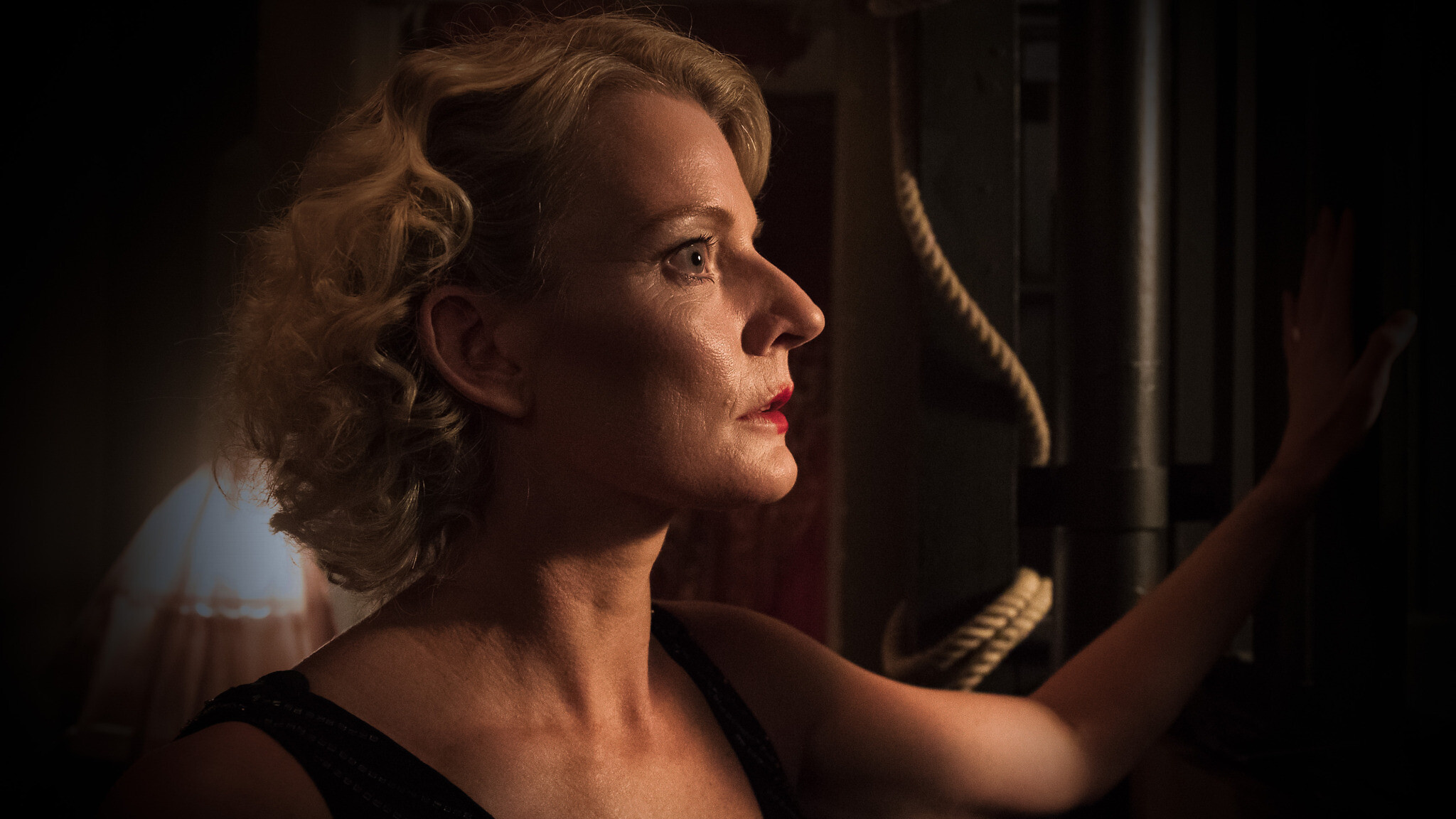
Another point ‘tapped’ home with grace is the thin line between good and evil. CJ Johnson doesn’t give anything away as the stoic Katharina (think Melanie Laurent in Inglorious Basterds) hiding a little girl. Jack Bennett is equally subtle as Otto, a Nazi who conjures up Ralph Fiennes and Sam Rockwell at their most doubtful in uniform. His unsteadiness is symbolised by the missing button on one shoulder lapel; something for which a Nazi might receive a lashing.
“A half-born Nazi,” explains Bartlett of Otto. “Someone who might have – had this not come along – continued being a clock-maker in Freiburg, and never really discovered this dark, feral side. I think people can be turned into things, and that’s what bothers me about the world over the past five years.”
“People were told they had a good reason to hate Jews, even though they’ve known their Jewish neighbour for years, fed their dogs…and within ten years, they were spitting at them. That horrifies me more than Hitler, because his type is rare. I didn’t want Otto to stomp in there. I wanted him to be a faltering guy.”
 The film reminds us of the banality of evil. On opening Mousie’s enclosure, Katharina scolds her for making noise. The camera peers up at her from Mousie’s hole. “Do as you’re told,” Katharina barks, as we veer to a sign outside the window that reads ‘The Youth Serve Hitler’. Though she is the girl’s warden – and though the child calls her ‘The White Witch’ in anger – we come to understand she is no Nazi; she is protecting Mousie from them. And while the stakes are far higher in the film, parents during lockdown will recognise the feeling of helplessness in asking a child to stay in an enclosed space for their own good. In this case, Katharina’s warning is futile. And that’s right, because artists don’t do as they’re told; Nazis do.
The film reminds us of the banality of evil. On opening Mousie’s enclosure, Katharina scolds her for making noise. The camera peers up at her from Mousie’s hole. “Do as you’re told,” Katharina barks, as we veer to a sign outside the window that reads ‘The Youth Serve Hitler’. Though she is the girl’s warden – and though the child calls her ‘The White Witch’ in anger – we come to understand she is no Nazi; she is protecting Mousie from them. And while the stakes are far higher in the film, parents during lockdown will recognise the feeling of helplessness in asking a child to stay in an enclosed space for their own good. In this case, Katharina’s warning is futile. And that’s right, because artists don’t do as they’re told; Nazis do.
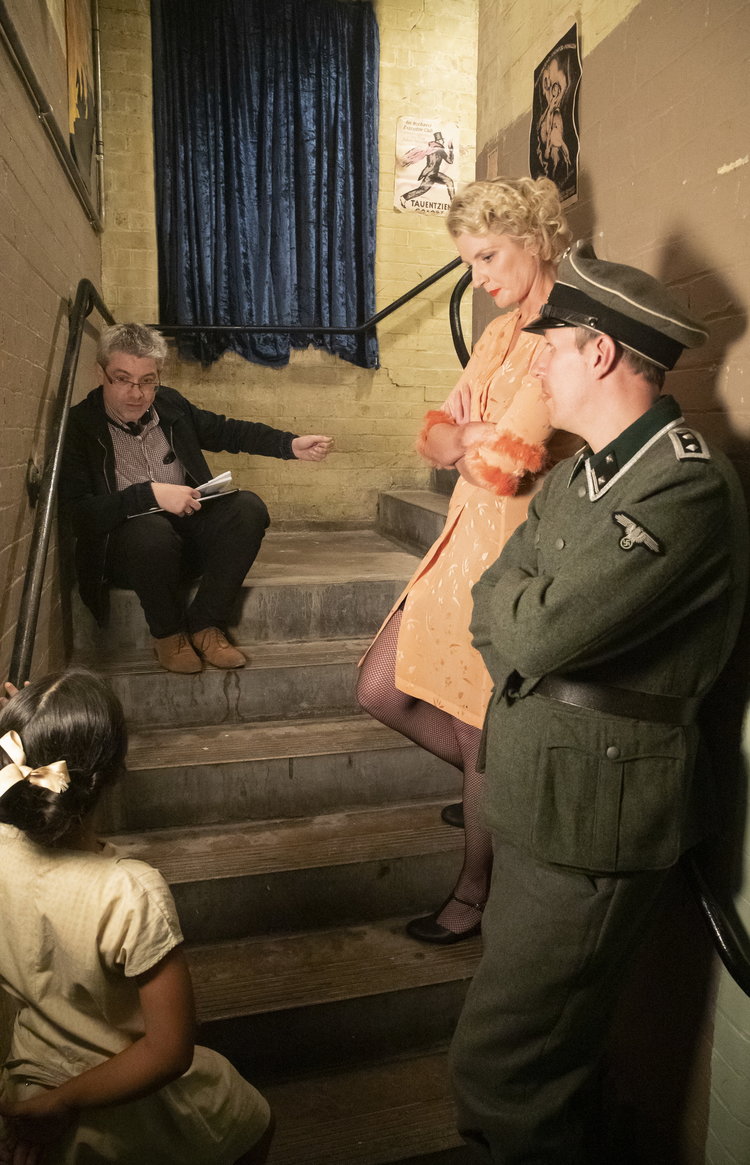
What follows is a cat-and-mouse game between Mousie, the White Witch, the Dancing Devil and two Nazis, culminating in an extraordinary climax that ventures into magical realism, and a meaning open to interpretation. Bartlett tells me, “Some people go: ‘Ah man, I loved the end,’ and other people are consumed by the terror and the trauma of it.” Whether you leave in triumph or despair depends on your reading of the scene, though tissues are advised in either case.
Much of the film plays out without dialogue, paying tribute to the burlesque acts it portrays. “Silent film is a huge part of my artistic upbringing,”says Bartlett. “When the horrible tyranny of the blank page is staring at you, you want to fill it up. But I’m a big believer in taking lines out.” And here, the images of devils dancing, a second Nazi’s out-stuck tongue and a little girl dressed as a mouse twirling in the street are enough to live long in the memory. As ever, it’s the uniforms – as much as the people – that command attention.
• To see Mousie for free visit: www.omeleto.com/257467/
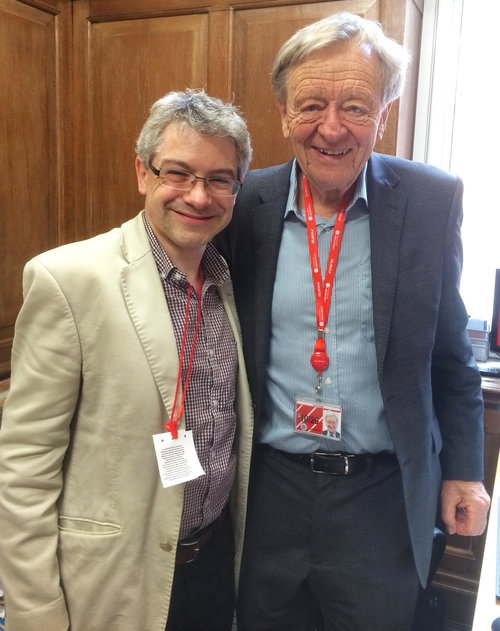
Behind the Camera
Self-funded on a shoestring, none of the cast and crew were paid formaking Mousie which is executive produced by Sir Derek Jacobi. “We all believed in the message of the film, and donated our time in honour of the charity that will receive any profits from it,” explains David Bartlett pictured here with Lord Alfred Dubbs who is a patron of The Separated Child Foundation. In the absence of financial reward, there is compensation in the critical praise Mousie has received and the film has been selected for 45 festivals worldwide, including the Boca Raton Jewish Film Festival next year. Across seven countries, Mousie has accrued 28 awards and nominations – most recently three Best Film awards and a Best Director gongs in Italy. And best of all Mousie is now eligible for an Academy Award.
www.separatedchild.org

Thank you for helping to make Jewish News the leading source of news and opinion for the UK Jewish community. Today we're asking for your invaluable help to continue putting our community first in everything we do.
For as little as £5 a month you can help sustain the vital work we do in celebrating and standing up for Jewish life in Britain.
Jewish News holds our community together and keeps us connected. Like a synagogue, it’s where people turn to feel part of something bigger. It also proudly shows the rest of Britain the vibrancy and rich culture of modern Jewish life.
You can make a quick and easy one-off or monthly contribution of £5, £10, £20 or any other sum you’re comfortable with.
100% of your donation will help us continue celebrating our community, in all its dynamic diversity...
Engaging
Being a community platform means so much more than producing a newspaper and website. One of our proudest roles is media partnering with our invaluable charities to amplify the outstanding work they do to help us all.
Celebrating
There’s no shortage of oys in the world but Jewish News takes every opportunity to celebrate the joys too, through projects like Night of Heroes, 40 Under 40 and other compelling countdowns that make the community kvell with pride.
Pioneering
In the first collaboration between media outlets from different faiths, Jewish News worked with British Muslim TV and Church Times to produce a list of young activists leading the way on interfaith understanding.
Campaigning
Royal Mail issued a stamp honouring Holocaust hero Sir Nicholas Winton after a Jewish News campaign attracted more than 100,000 backers. Jewish Newsalso produces special editions of the paper highlighting pressing issues including mental health and Holocaust remembrance.
Easy access
In an age when news is readily accessible, Jewish News provides high-quality content free online and offline, removing any financial barriers to connecting people.
Voice of our community to wider society
The Jewish News team regularly appears on TV, radio and on the pages of the national press to comment on stories about the Jewish community. Easy access to the paper on the streets of London also means Jewish News provides an invaluable window into the community for the country at large.
We hope you agree all this is worth preserving.
-
By Brigit Grant
-
By Laurent Vaughan - Senior Associate (Bishop & Sewell Solicitors)
-
By Laurent Vaughan - Senior Associate (Bishop & Sewell Solicitors)
-
By Laurent Vaughan - Senior Associate (Bishop & Sewell Solicitors)
-
By Laurent Vaughan - Senior Associate (Bishop & Sewell Solicitors)


